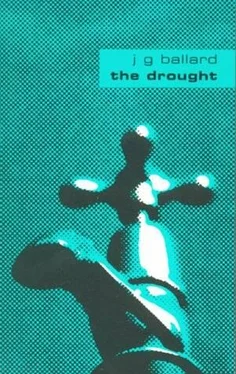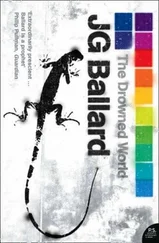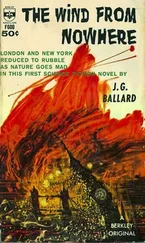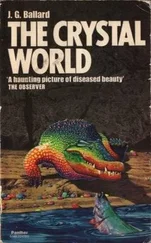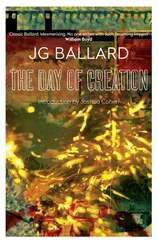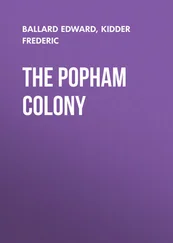Several cars had been driven down off the embankment in an attempt to cross the river. They lay half-buried in the drifts of dust, the slopes of fine powder covering their seats. Mrs. Quilter lingered by them, as if hoping that they might suddenly resurrect themselves, then gathered her silks around her and shuffled off on Catherine Austen's arm.
They reached the flat bed of the main channel and walked past the collapsed midsection of the bridge. The detonation leads looped back to the south shore. Listening for any sounds of traffic ahead, Ransom tripped, nearly dropping Mr. Jordan.
"Dr. Ransom, please rest for a moment," the old Negro apologized. "I am sorry to be this burden to you."
"Not at all. I was star-gazing." Ransom lowered the poles and wiped his face. During their journey to the south he had felt an increasing sense of vacuum, as if he was pointlessly following a vestigial instinct that -no longer had any real meaning for him. The four people with him were becoming more and more shadowy, residues of themselves as notional as the empty river. He watched Catherine and Mrs. Quilter climb on to a fallen steel girder that spanned the stream, trying to see them only in terms of the sand and dust, of the eroding slopes and concealed shadows.
"Doctor." Philip touched his arm. "Over there."
He followed Philip's raised hand. Two hundred yards away the solitary figure of a man was walking slowly along the drained white channel. He was moving away from them upstream, a few feet from the narrow trickle of black water at which, now and then, he seemed to cast a vague eye, as if out on some quiet reflective stroll. He was wearing a suit of faded cotton, almost the color of the bleached deck around him, but carried no equipment, apparently unaware of the sunlight on his head and shoulders.
"Where's he going?" Philip asked. "Shall I call to him?"
"No, leave him." Without thinking, Ransom walked forward a few paces, as if following the man. He waited, almost expecting to see a dog appear and run around the man's heels. The absolute isolation of the chalkwhite promenade, with its empty perspectives, focused an intense light upon the solitary travelers For some reason, this strange figure, detached from the pressing anxieties of the drought and exodus, seemed a compass of all the unstated motives that Ransom had man aged to repress during the previous days.
"Doctor, let's go on."
"Just a moment, Philip."
The elusive significance of this figure, disappearing along the heat-glazed bed, still puzzled Ransom as he sat with the others on the south embankment. Philip lit a small fire, and they ate a meal of warm rice. Ransom swallowed a few spoonfuls of the tasteless gruel, and then gave his plate back to Philip. Even Catherine Austen, leaning one arm on his shoulder as he gazed out over the broad bed of the river, failed to distract him. With an effort, he joined the others as they climbed the embankment, pulling Mr. Jordan up behind them.
The road to the south was clear of cars. The remains of an army post were scattered along the verge. Cooking utensils hung from tripods outside the deserted tents, and a truck lay on its side among the bales of wire and old tires.
Mrs. Quilter snorted in disgust. "Where's all the cars gone off to, doctor? We'll be wanting one for my old legs, you know."
"There may be some soon. You'll simply have to walk until we find one."
Already he was losing interest in her. The poles of the litter pressed into his shoulders. He labored slowly along the road, still thinking of the solitary man on the riverbed.
Two hours later, after they had found a car, they reached the foothills of the coastal range. Slowly they followed the road upwards, winding past burnt-out orchards and groves of brittle trees like the remnants of a petrified forest. Around them in the hills drifted the smoke of small fires, the white plumes wandering down the valleys. Here and there they saw the low roofs of primitive hovels built up on the crests. The wooded slopes below were littered with the shells of cars tipped over the edge of the road. They began to descend through a narrow cutting, and emerged on to one side of a wide canyon. At the bottom, in the bed of a dried-up stream, a timber fire burned briskly. Two men worked beside a small still, their bare chests blackened by charcoal, ignored the passing car.
The trees receded to give them a view of a distant headland, partly veiled by the long plumes of smoke moving inland. Suddenly the car was filled with the sharp tang of brine. A final bend lay ahead, and then in front of them was the gray hazy disc of the sea. On the edge of the bluff, partly blocking their view, two men sat on the roof of a car, gazing down at the coastal shelf below. They glanced back at the approaching car, their faces thin and drawn in the sunlight. More cars were parked around the bend, and along the road as it wound downwards to the shore. People sat on the roofs and hoods, gazing at the sea.
Ransom stopped the car and switched off the engine. Below them, stretching along the entire extent of the coastal shelf, were tens of thousands of cars and trailers, jammed together like vehicles in an immense parking lot. Tents and wooden shacks were squeezed between them, packed more and more tightly together as they neared the beach, where they overran the dunes and sandflats. A small group of naval craft-gray patrol boats and coast-guard cutters-were moored a quarter of a mile offshore. Long metal piers had been built out into the water toward them, and there was no clear dividing line between the sea and the shore. At intervals along the dunes stood a number of large metal huts, almost the size of aircraft hangers. Around them tall distillation columns steamed into the air, their vapor mingling with the smoke of the fires burning across the whole eighthundred-yard width of the coastal shelf. The distant sounds of machinery were carried across to the cliff, and for a moment the clanking noise of the pumping gear and the bright galvanized iron roofs along the dunes made the whole area resemble a gigantic beachside funfair, the carparks crammed with millions of would-be participants.
Catherine Austen took Ransom's arm. "Charles, we'll never get down there. All these people!"
Ransom opened his door. The car seemed as overcrowded as the vast concourse below, a meaningless replication of identity in which an infinite number of doubles of himself were being generated by some cancerous division of time. He peered down through the smoke, trying to find even a single free space. Here and there, in the garden of a house or behind a derelict filling station, there was room for a few more vehicles, but the approach lanes were closed. One or two cars crawled about the churned-up roadways, like ants blindly moving with no notion of their overall direction; but otherwise the whole congested extent of the shore had settled into an immovable jam. Everywhere people sat on the roofs of cars and trailers, staring out through the smoke toward the sea.
The only signs of organized activity came from the beach area. Trucks sped along a road between the dunes, and the lines of cars parked behind the metal huts formed neat patterns. Lines of tents shone in the sunlight, grouped around communal kitchens and service units.
"Wait here." Ransom stepped from the car and walked along to the two men sitting on the roof of the car nearby.
He nodded to them. "We've just arrived. How do we get down to the beach?"
The older of the two, a man of sixty, ignored Ransom. He was staring, not at the congestion below, but at the far horizon, where the sea dissolved in a pale haze. The fixity of his expression reminded Ransom of the obsessed cloudwatchers on their towers in Larchmont.
"We need water," Ransom explained patiently. "We've come a hundred miles today. There's an elderly cripple in the car."
Читать дальше
Конец ознакомительного отрывка
Купить книгу
